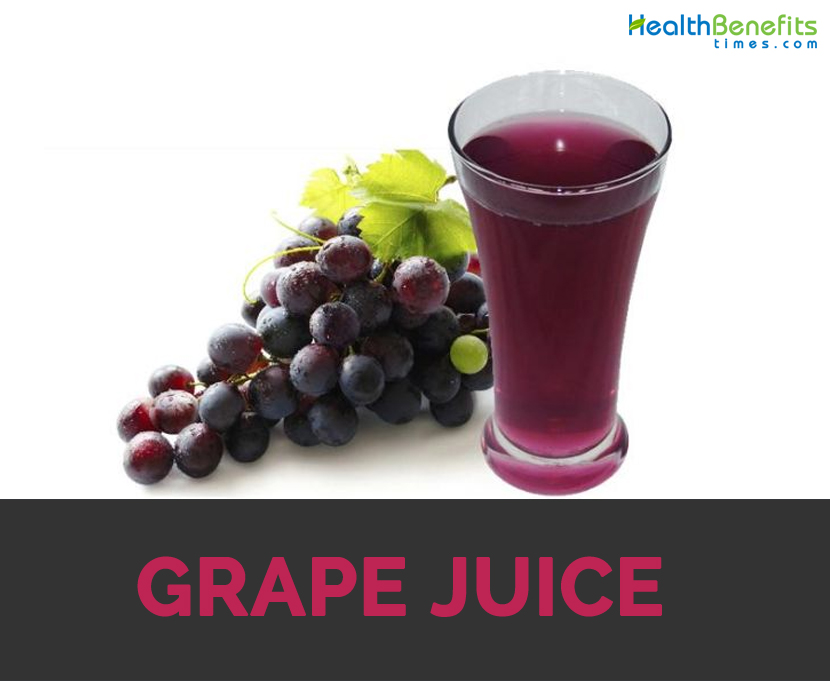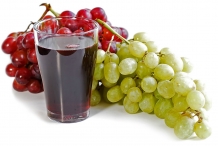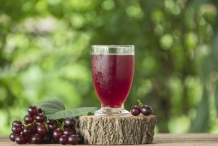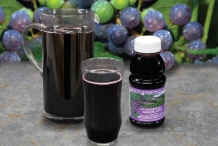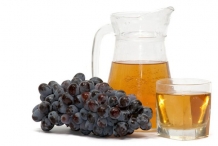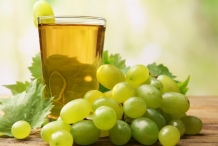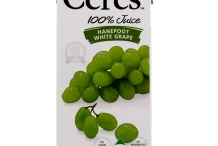| Grape juice Quick Facts |
| Name: |
Grape juice |
| Colors |
Light green, Dark purple |
| Taste |
Tart, sweet |
| Calories |
152 Kcal./cup |
| Major nutrients |
Carbohydrate (28.75%)
Manganese (26.30%)
Fluoride (8.73%)
Iron (7.88%)
Vitamin B6 (6.23%)
|
| Health benefits |
Skin care, Brain health, Cancer prevention, Manage blood pressure, Care for hair |
Grapes are the fruit of Vitis vinifera which has been used for thousands of years due to its medicinal and nutritional value. It has high content of flavonoids, sugar, proanthocyanins, anthocyanins, tannin, organic acids, vitamins and mineral salts. Study shows that resveratrol is considered to be strongest natural antioxidants which are found in grape seed, juice and skin. Juice is made from grapes which have 5000 to 10000 different subspecies or cultivars of grapes. Grape juice is the popular drink for children and adults but grape juice found in store is loaded with sugar making less healthy.
Grape juice has various components as wine offering numerous health benefits. The nutrients are lower than the grape themselves but could be tart and delicious beverage which provides boost of energy. Grape juice is made from darker and purple grapes containing high content of antioxidants but green, white and red grapes are also used to makes various juice. The juice is acquired by blending and crushing grapes into liquid. Generally, juice is sold in stores and fermented or made into brandy, wine and vinegar. The common grape juice is purple in North America which is made from Concord grapes and white grape juice is made from Niagara grapes, both varieties belong to American grapes which is a different species from European wine grapes.
Grape juice is packed with antioxidants, nutrients, mineral and vitamins which makes one fit. Like grape juice helps to slow down the chances of neuro-degenerative diseases. A glass of grape juice daily helps to get flawless and clear skin naturally. Anti-ageing properties found in grape juice speeds up metabolism and promote perspiration which helps to get youthful and radiant skin.
Origin
Vitis vinifera is inherent to Western Asia and Southern Europe which is cultivated in all the temperate regions of the world comprising 60 inter-fertile wild Vitis species distributed in North America, Asia and Europe under subtropical, temperate, continental and Mediterranean climatic conditions.
Health Benefits of Grape juice
Grapes are known as the queen of fruits. Everyone be it kids or adults, love grapes for its tart taste. Grapes are loaded with health promoting nutrients such as vitamins, antioxidants and minerals which are needed to maintain healthy body. With healthy nutrients, grapes help to assist growth in kids. The beneficial health properties help to lower platelet activity having similar effect of aspirin. It helps to promote cognitive function in older adults with memory decline. Purple grape juice has high phenolics which is a phytonutrient providing protection against Alzheimer’s disease. Grape juice helps to increase thermogenesis or fat oxidation which promote metabolism.
- Skin care
Grape juice is loaded with antioxidants preventing signs of aging and promotes skin appearance. The daily consumption of homemade grape juice helps in preventing wrinkles or other age spots also speeds the healing of blemishes and scars.
- Brain health
Grape juice has resveratrol and anthocyanins which are associated to improving cognition by lowering oxidative stress. Antioxidants lower deposition of plaque and prevent conditions such as Parkinson’s disease and Alzheimer’s disease.
- Cancer prevention
Antioxidants are associated with cancer preventing neutralizing free radicals which results cellular mutation and enhancing apoptosis in cancerous cells.
- Manage blood pressure
Grape juice have healthy level of potassium and small amounts of dietary fiber that optimizes heart health and lowers blood pressure, prevent the chances of heart attacks, atherosclerosis and strokes.
- Care for hair
Apply grape juice to the scalp directly which helps to lower inflammatory conditions but simply people drink it. An upgrade of concentrated minerals and nutrients helps to promote follicle health and luster of locks.
- Provides energy
Fruit juice contains high content of carbohydrates that makes it an exceptional energy booster. The serving of a glass or two sustain through afternoon or morning but since natural sugars wear off eventually, one should beware of inevitable sugar crash.
- Healthy cholesterol
Those who are concerned about the level of cholesterol should grab a glass of grape juice. Study shows that grape juice helps to lower the level of bad cholesterol in arteries which assures to control the cholesterol level and assist in efficient blood flow in the body.
- Prevent heart problems
Grape juice enhance production of nitric oxide assuring the blood vessels are flexible keeping the blood pressure under control so that heart remains healthy and prevent the chances of heart problems.
- Acts as laxative
Grape juice is a natural solution for infants and elders who experience digestion associated problems as well as constipation. It contains natural laxatives which promotes good health of digestive and bowel system.
- Period regularity
Usually women suffer from scanty and irregular menses during early years of puberty or during menopausal phase. In order to prevent this problem, consume equal quantity of honey, grapes juice and crushed dry dates daily on empty stomach for a month.
- Strengthen bones
Grape juice is a great source of iron, copper and manganese which plays a vital role in forming bones and maintains its strength. One should ensure healthy bone density with an intake of grape juice in diet.
https://www.youtube.com/watch?v=HBJTUEYFobw
How to Store
It is advisable to drink off the freshly prepared black grape juice as it is extracted to prevent the nutrient loss as much as possible. Juice bottled and stored at freezing temperature upto 2’C can be stored for around a week, but the pigments present may lose its color and also its flavor may change. Processed juice stored in unopened jars or tins can last upto 12 months.
Traditional uses
- Consume grape juice daily to prevent the chances of acidity and cough.
- Intake of grape juice in the morning helps to cure migraine.
- It is also helpful in curing blood disorders or flushing harmful toxins from the body.
- It is a cure for constipation.
- It is also used to treat asthma.
- Purple grape juice helps to counteract atherosclerosis.
- It is a treatment for gout and minor infections.
- Drink grape juice to get smooth and glowing skin as this juice contains collagen.
- This juice helps to treat acidity.
Precautions
- People who are allergic to grapes should avoid the juice as well.
- Consume it in moderate amounts to get health benefits.
How to Eat
- It is used as a sweetener.
- Drink this juice plain or blend with other fruit juices making fruit punch or fruit cocktail.
- Mix black salt, tamarind pulp, crushed ice and black grape juice to make sherbet.
References:
https://en.wikipedia.org/wiki/Grape_juice
https://www.cropscience.bayer.com/en/crop-compendium/crops/grapevine-grape
http://www.tsijournals.com/articles/a-review-on-benefits-and-uses-of-vitis-vinifera-grape.pdf
http://brainstrom.org/15-health-benefits-of-grapes-juice/
https://www.tarladalal.com/glossary-black-grape-juice-1247i
https://www.dabur.com/realfruitpower/fruit-juices/grapes-juice
https://nutritionfacts.org/topics/grape-juice/
https://www.organicfacts.net/grape-juice.html
Comments
comments


